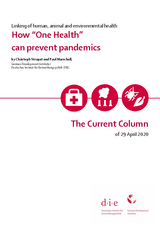The Current Column
Linking of human, animal and environmental health
How “One Health” can prevent pandemics
Strupat, Christoph / Paul MarschallThe Current Column (2020)
Bonn: German Development Institute / Deutsches Institut für Entwicklungspolitik (DIE), The Current Column of 29 April 2020
The corona crisis has grave consequences for health, the economy and society. Pandemics such as COVID-19, Ebola and cholera will return repeatedly unless we understand what causes them. New infectious diseases in humans are often unleashed by viruses and bacteria in wild animals. The destruction of undisturbed ecosystems brings humans into closer contact with animal species that could transmit hitherto unknown pathogens. Consequently, the only way to successfully prevent localised epidemics and continental pandemics is to view human, animal and environmental health as one unit, as it is in the One Health concept. The interlinkages of this concept with the Sustainable Development Goals (SDGs) make it possible to promote the SDG agenda. If we want to learn from the corona crisis we need to adopt a holistic approach.
Only two decades ago, it was assumed that diseases such as Ebola, AIDS and dengue fever were caused by viruses transmitted to humans from tropical forest areas. However, it appears that it is in fact the destruction of biodiversity by humans that creates the conditions for the spread of new diseases and viruses. Logging, mining, road construction and population growth all bring people into closer contact with animal species. It is estimated that three quarters of the newly occurring illnesses that infect humans originate in animals, triggered by viruses or bacteria.
Cooperation between the health, agricultural, food and climate-change-mitigation sectors is therefore essential if we are to prevent further epidemics and pandemics. To keep working in silos will not suffice. Linking human and veterinary medicine through joint vaccination services for humans and animals, is foundational for implementing One Health. International organisations such as the World Health Organization (WHO), the UN Food and Agriculture Organization (FAO) and the World Organisation for Animal Health (OIE) are the main players advocating for sustainable implementation of the One Health approach. The One Health concept illustrates the links between SDGs such as health (SDG 3), climate (SDG 13), life on land and in water (SDG 15, 14) and can therefore play a central role in generating a leverage effect for achieving these goals. German development cooperation should thus be guided by the One Health approach and use the instruments of bilateral and multilateral cooperation to address it accordingly. There are three coordinated measures that are key when it comes to supporting developing countries.
First, health systems should be strengthened to achieve universal health coverage. Only a robust and well-prepared health system will be able to prevent, treat and systematically contain the spread of infectious diseases. It is especially important in this context that health care staff are trained, and that laboratory capacities are expanded. Well-qualified health care staff can, for instance, educate people on the dangers of eating high-risk animals and thereby help to prevent transmission of diseases from animals to humans. Veterinary practitioners and researchers should be involved and supported in this process. Mauritania is a good example in this context. Following the outbreak of Rift Valley fever, transmitted by camels, communication campaigns were conducted in order to inform livestock breeders, abattoir workers and the public about the risks.
Second, countries should be assisted to address potential sources of risk, such as informal animal markets (wet markets). These are often places where viruses and other pathogens are transmitted. At the same time, they are frequently sources of food and income for hundreds of millions of poor people. If these risk sources are to be adequately addressed in the short-term, then efforts will need to be undertaken to promote public awareness and better hygiene practices. To this end, use can be made of digital early-warning systems, which can warn the population of potential outbreaks at specific animal markets by text messages. Access to clean water and sanitation services is also important, as it facilitates better hygiene practices in the slaughter of livestock and the storage of their meat at markets.
Third, it is necessary to support the establishment and management of conservation areas to provide a refuge for wild animals. Support should be provided to developing countries to enable them to create and comply with guidelines and legal frameworks for the sustainable management of biological resources and ecosystems. Excessive logging in Malaysia’s tropical forests, for instance, caused large fruit bats to leave their original habitat and settle in close proximity to pig farms. Their faeces and saliva infected the pigs and then the farmers with the Nipah virus. The preservation of ecosystems, which could be encouraged through financial incentives, helps to prevent diseases that are transmitted by animals.
It is possible that the corona pandemic could unleash a massive humanitarian disaster in many developing countries. Forecasts by the UN Economic Commission for Africa indicate that 1.2 billion people could become infected with the novel coronavirus in Africa and up to 3.3 million of them could die. Striking a sustainable balance between the health of animals, the ecosystem and humans is the only way to prevent the return of these pandemics.
This Current Column is part of a special series that is exploring the developmental and socioeconomic consequences of the corona crisis. You can find more articles like this on The Current Column’s overview page.
- Coronavirus as an opportunity for international cooperation
- Why social protection is crucial in the corona crisis
- How we will need to tackle climate migration post-coronavirus
- Parallels between the corona pandemic and climate change
- What we can learn from and about Africa in the corona crisis
- How the EU and rising powers can shape their future sustainably
- How the corona crisis is calling into question the “right to the city”
- Is the coronavirus threatening a developing-country debt crisis?
- Is the pandemic deepening the digital divide?
- Tackling the pandemic without doing away with democracy
- How the international financial institutions are responding to the pandemic
- Assuring equitable access to COVID-19 vaccines and treatments
- The marginalised as the weakest link in pandemics
- Incentives and rules for fair supply chains
- From COVID-19 to climate action
- How to respond inclusively to COVID-19 in the interests of the common good
- Why the Corona crisis is particularly difficult for right-wing populist governments
- What does the EU recovery plan mean for the European Green Deal?
- Growing inequality can worsen the pandemic’s effects
- COVID-19 has not killed global populism
- A fundamental transformation of tax systems is needed in the wake of Covid-19
- Germany’s EU Council Presidency faces a monumental task


